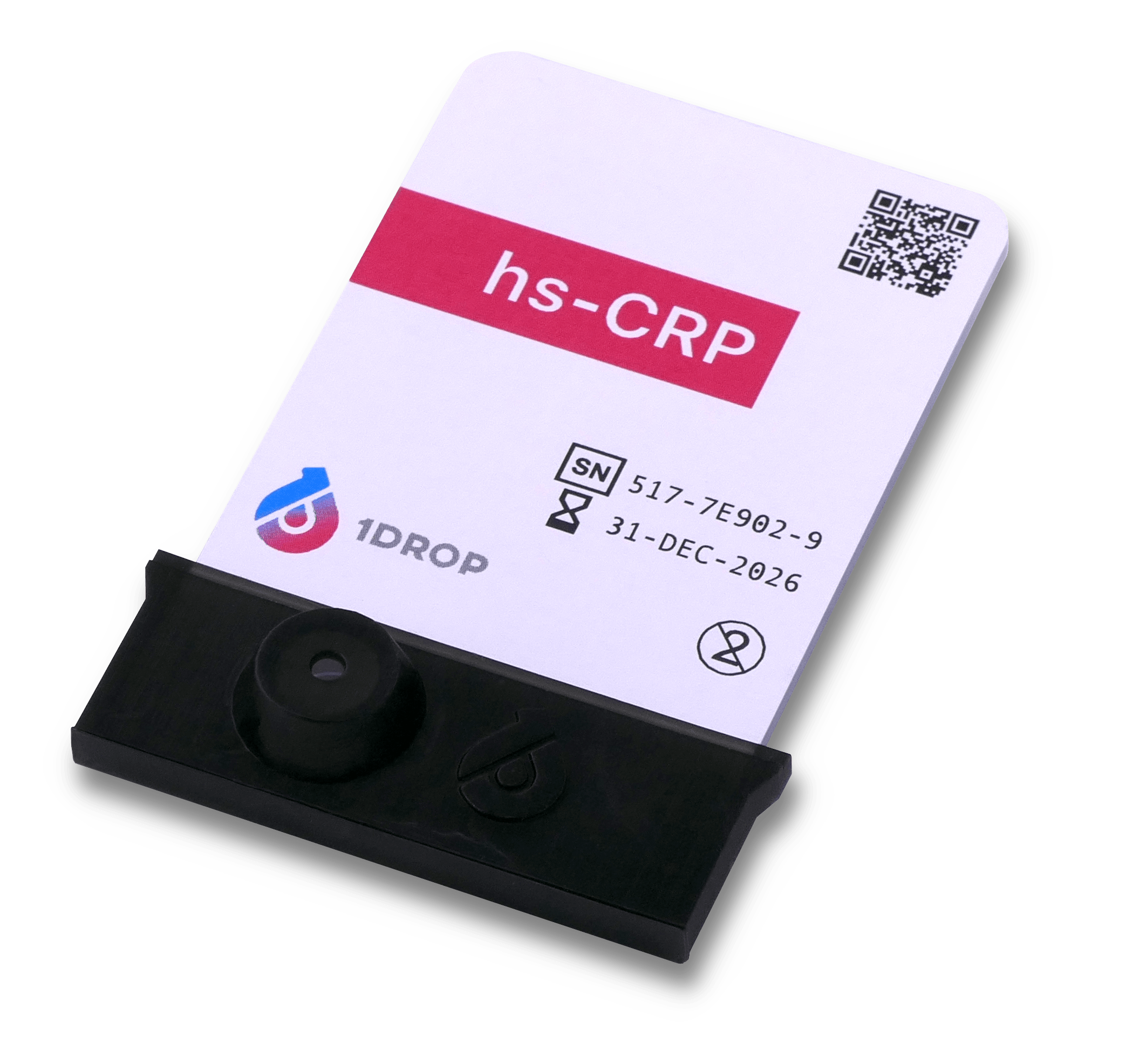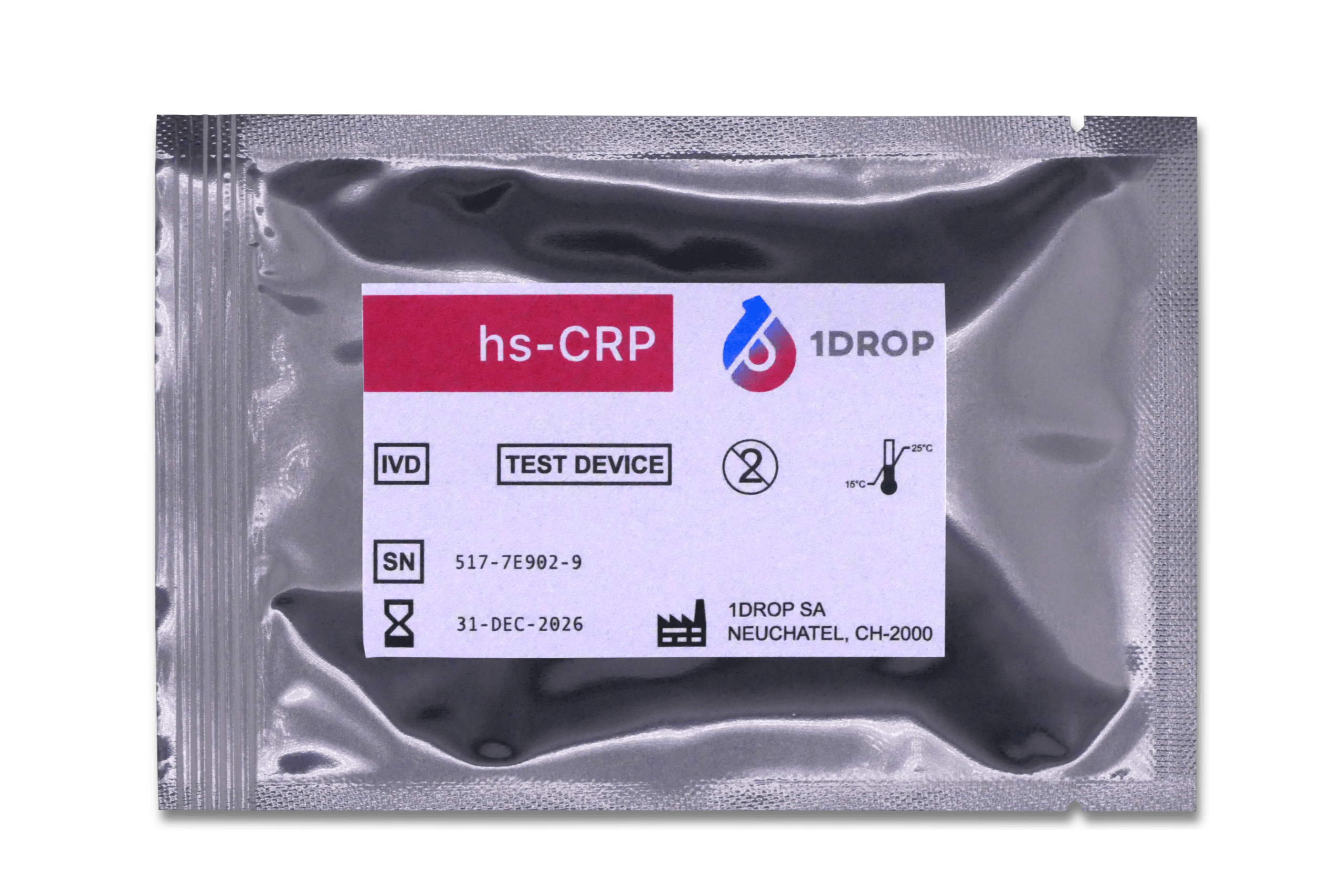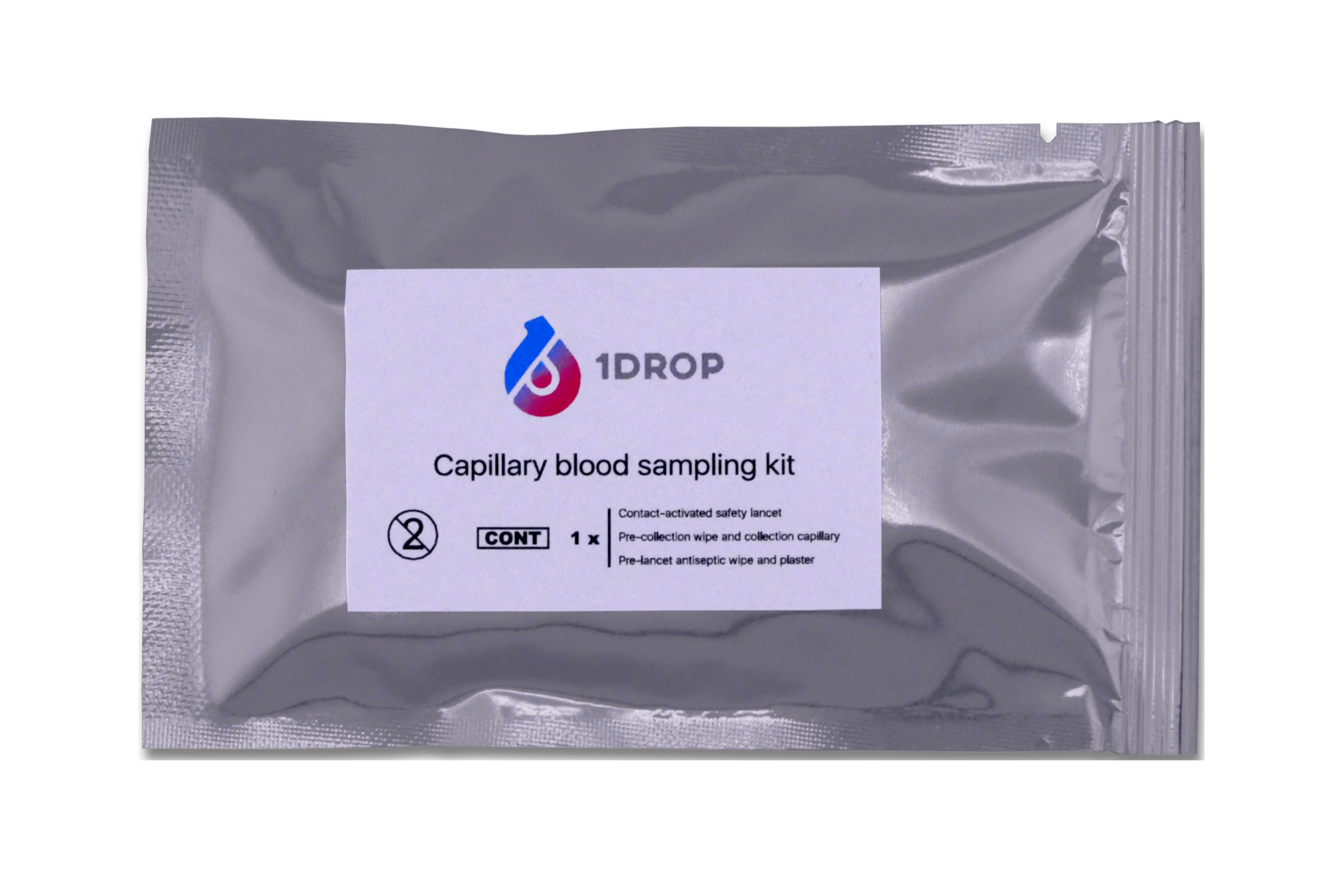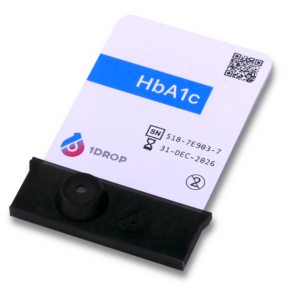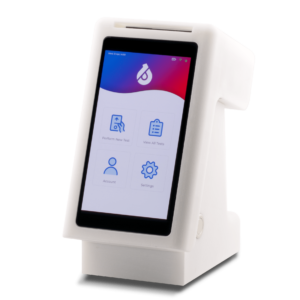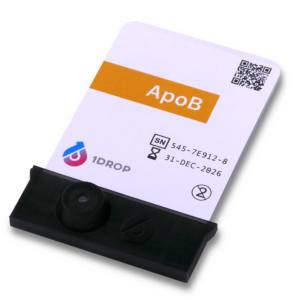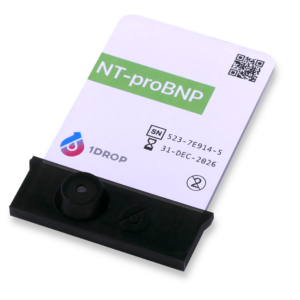High-sensitivity C-reactive protein (hs-CRP)
CHF 59.00
Inflammation helps the body combat or repair damage. The high-sensitivity C-reactive protein (hs-CRP) Test measures low persistent levels of inflammation to assess the risk of developing cardiovascular disease (CVD).
This is a pre-order product. We plan FDA 510(k) Clearance in North America and CE Mark in Europe in Q4 2024. We plan to start shipping in Q1 2025.
Capillary Blood Sample
Finger prick collection
Age 18+
10 minutes time to result
About the test
C-reactive protein is produced by the liver. Its concentration in blood usually rises when there is inflammation due to tissue damage or infection. C-reactive protein levels can increase up to 1000 times following a severe event. The hs-CRP test is more sensitive than the standard CRP test and can detect persistent low levels of inflammation, which may be associated with the development of CVD.
It is recommended to repeat the test twice, optimally two weeks apart, to confirm persistent inflammation.
This test is not designed for diagnosing or monitoring serious inflammatory conditions; for this purpose, we recommend a standard CRP test.
Who should take this test
This test is suitable if you:
- Are healthy and do not have symptoms of CVD
- Are at risk of CVD and would like to learn more
- Are interested in a more sensitive measure of your CRP levels to assess your risk of CVD
- Have a family history of CVD
This test is not suitable if you:
- Have a condition associated with chronic inflammation such as autoimmune disease (rheumatoid arthritis, inflammatory bowel disease, etc.), a bleeding disorder, an infection, recent surgery or injury
- Have experienced a serious CVD event such as a heart attack or stroke
What’s tested
C-reactive protein (CRP) is produced by the liver when inflammation is present in the body. CRP levels can quickly rise in response to inflammation and then quickly decrease once the condition is resolved. A persistent low level of inflammation may indicate atherosclerosis (narrowing of blood vessels due to the accumulation of cholesterol and other lipids), which is commonly linked to CVD. The hs-CRP test measures small amounts of CRP in the blood and can be used by healthcare professionals to assess cardiovascular risk.
Signs and Symptoms
This test assesses the risk of CVD in healthy individuals. If you are experiencing any of these symptoms, SEEK MEDICAL ASSISTANCE IMMEDIATELY:
- Shortness of breath
- Chest pain or discomfort
- Pain or weakness in one or both arms
- Pain in the back, neck, jaw, or stomach
- Speech difficulty
- Symptoms associated with stroke such as face drooping, numbness, or confusion
Eligibility
The hs-CRP Test is available for anyone over the age of 18 who wishes to measure their hs-CRP to evaluate their risk of CVD.
Before your Test
No special preparation is needed for this test. Fasting is not necessary.
After your Test
Your test results will be available in the 1DROP App and patient portal on the website, tablet or computer. You will receive a comprehensive and easy-to-understand report. You will be alerted if your results are outside the normal ranges.
Interpret the Results
High hs-CRP levels in otherwise healthy people have been associated with an increased risk of heart attack, stroke, sudden cardiac death, and peripheral arterial disease, even when cholesterol levels are within the normal range.
The American Heart Association and the European Society of Cardiology have categorized hs-CRP levels into three risk groups:
- Below 1.0 mg/L low risk
- 1.0 to 3.0 mg/L average risk
- Above 3.0 mg/L high risk
People with hs-CRP levels at the high end of the normal range have 1.5 to four times the risk of having a heart attack as those with hs-CRP values at the low end of the normal range.
HOW IT WORKS
Order online test anywhere

Choose Your Tests
Shop for tests on the 1DROP website or App. Order your tests and they will be shipped to you.

Test Your Sample
Insert the Chip into the Reader. Collect a finger prick of blood and place it on the Chip. The 1DROP Reader analyzes your sample within 15 minutes.

View Your Results
View your test results on the secure and private patient portal on your smartphone, tablet or computer. Easily share your results with your doctor, family, friends. Obtain guidance on your next steps.
BENEFITS
Take control of your health
Easy, rapid, affordable home testing
Convenient and Fast
Shop and order tests online without a doctor’s visit. Receive your 1DROP testing system. Test anywhere at your convenience. Sample to test results within 15 minutes.
Easy to Use and Understand
Follow on-screen instructions. Easy-to-use test procedure. Understand test results and receive meaningful insight into your health.
Personalized
View personalized report of biomarker test results. View detailed information about the meaning of your test results.
Reduce Preanalytical Error
The preanalytical phase accounts for over 60% of clinical laboratory errors. Common preanalytical errors involve test selection, patient identification, collection, handling, transport, processing, labeling and storage. These errors can lead to inaccurate test results with serious implications for patient care. Your 1DROP test eliminates or reduces most preanalytical errors.
Private & Secure
1DROP is GDPR and HIPAA compliant. We take your privacy very seriously. Your data is stored securely using state-of-the-art encryption. We never sell your data.
Actionable Health Information
Your test results are available in the patient portal on your smartphone, tablet or computer. Knowing your health information enables you to take action for your health. You can share your results with your doctor, family or friends.
QUESTIONS
1. What is the difference between CRP and hs-CRP?
The standard CRP test and hs-CRP test both measure c-reactive protein (CRP) levels in the blood. The difference is in the measured concentration range and the results serve different purposes. The standard CRP test measures CRP from 10 mg/L to 1000 mg/L to evaluate those with signs and symptoms of an infection or chronic inflammation. The hs-CRP test measures CRP from 0.3 mg/L to 10 mg/L to ascertain the risk of CVD in people without any symptoms. The hs-CRP test is not suitable for people showing signs or symptoms of infection or inflammation.
2. If I have high levels of hs-CRP, am I at risk of cardiovascular disease, heart attack, or stroke?
A single test with an elevated hs-CRP level may be an indication of a myocardial infarction, stroke, peripheral vascular disease, or sudden cardiac death. Repeated tests with high levels of hs-CRP mean you are at an increased risk of having a heart attack, stroke, or CVD. Your healthcare provider can review your medical history, symptoms, and test results to assess your health risks.
3. If I have high levels of hs-CRP, what should be my next steps?
You should consult with your healthcare provider to evaluate your health risks and explore your next steps.
4. How can I lower my CRP?
Lifestyle changes should help lower inflammation. By eating a healthy diet, exercising regularly, controlling your blood pressure, reducing cholesterol levels, quitting smoking, and making other heart-healthy changes, you may be able to reduce your CRP levels.
5. What is cardiovascular disease (CVD)?
Cardiovascular disease (CVD) is the leading cause of death worldwide and includes all types of heart and blood vessel disorders, such as clogged arteries (coronary heart disease), heart attacks, strokes, congenital heart defects, and peripheral artery disease.

